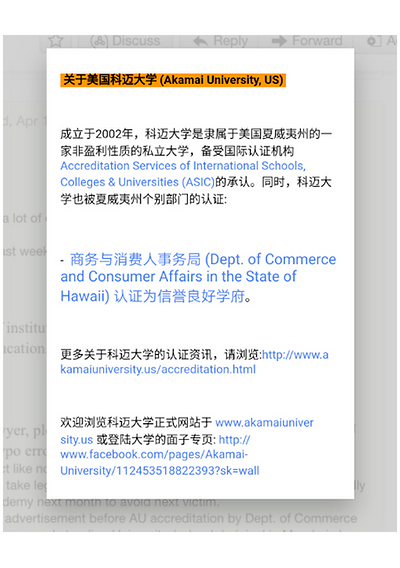(Read part 1 of How to Detect A Diploma Mill)
Threats Posed by A Diploma Mill
“The Council for Higher Education Accreditation (CHEA) is a well-trusted United States organization comprised of legitimate degree-granting colleges and universities. According to CHEA, the dangers posed by degree mills to society include:
1. Individuals with bogus degrees are inherently unqualified to work in fields that require rigorous training and years of study in order to achieve competency. Those who bypass accepted training standards put lives at risk.
2. Many degree mills offer bogus credentials in fields that include nursing, nutrition, electrical and mechanical engineering, biochemistry and accounting at significant risk to the public.
3. Not only do degree mills pose a threat to society, but unqualified people with bogus credentials displace those who have worked hard to earn legitimate degrees.
Why Not Attend An Unaccredited College or Universiy?
1. Financial aid: American students are only eligible for federal financial aid when attending accredited schools.
2. Apply or transfer: Only college-level credits from an accredited school can be accepted by another accredited institution.
3. Employment: The legitimate accreditation of a higher educational institution implies that the school’s quality adheres to widely accepted domestic and international standards. In many countries, only people with degrees from an accredited school can hold government positions.
4. Licensing: Many licensing authorities require applicants to have accredited degrees in order to qualify for licence testing.
5. Risk: Attending a non-accredited degree program is a waste of time, effort, and money.
Case Study on Akamai University
Given what you now know, read this and decide for yourself if Akamai University is a degree mill:
1. The school is registered with Hawaii Department of Commerce and Consumer Affairs as a Domestic Nonprofit Corporation (a company),yet it runs it’s business as a degree-granting school. This IS legal in Hawaii.
2. The school is located in Helo, Hawaii, and had 28 local students registered as of January 2014‘. Seven officers, including the school’s president, were listed in its filing with the Hawaii state government in 2017. The school offers over 65-degree and certificate programs to choose from.
3.. The school is NOT accredited by any accrediting agency recognized by the U.S. Department of Education. But keep in mind that Hawaii allows non-accredited post-secondary degree-granting institutions to operate as a business entity.
4. In Hawaii, non accredited degree-granting institutions are governed by Chapter 446E, HRS, Unaccredited Degree-Granting Institutions, and they neither licenses nor do they sanction these business entities. (Source:Hawaii.gov)
6. Akamai University works with the EDS Business School in Malaysia for degree-granting programs. The EDS’s Chinese flier below claims that “Akamai University is recognized (or accredited 认证) as a trusted institution.”

This is a false advertising and is in clear violation of Hawaii state government’s §446E-5 – Prohibited Practices.
§446E-5 Prohibited practices. (a) No unaccredited institution shall indicate or suggest that the State licenses, approves or regulates its operations.
7. The school’s tuition model is per charge per degree program – Bachelor’s degree (final 60 credits): $18,000; Master’s degree (requires 40 credits beyond bachelor’s degree): $12,000; Doctor degree (requires 52 credits beyond master’s degree): $15,600. These models differ in how most accredited schools operate. Most legitimate institutions charge a fee based on credit hours that lead to a degree.
8. Among the 59 degree and certificate programs offered at Akamai University, 49 of them are master’s and doctoral degrees, and postgraduate certificate programs. That is to say that 83% of its programs are for advanced studies. This begs the question, “,Why is a school with such as a high ratio of advanced programs unaccredited?”
9. All faculty research papers were added on Oct. 28, 2013 to the school’s website, yet nothing has been published thereafter or before.
10. Akamai University lists several faculty members who are supposed to have Ph.D. or doctoral degrees. However, no mention is made of where these faculty members had obtained their supposed advanced degrees: http://www.akamaiuni
11. Akamai University states “Our degrees are structured to be equivalent to degrees awarded by reputable institutions worldwide” but it does not mention the name of even one such “reputable institution”.
12. Akamai University is a U.S. school but it mentions its accreditation by ASIC – an accreditation body based in U.K, not in the U.S.
13. The following statement published by Akamai University implies that it is internationally accredited by legitimate and honest accreditation boards such as ASIC. However, the truth is not the same as it claims.
Akamai University is internationally accredited by the Accreditation Service for International Colleges (ASIC). The University has earned Premier status with ASIC for its commendable areas of operation. ASIC is an approved accrediting body for the purposes of compliance by the UK Border Agency (UKBA) is a member of the British Quality Foundation (BQF), sits on the Quality Standards Group of UK NARIC, and is one of a number of international accrediting bodies listed in the international directory by the Council for Higher Education Accreditation (CHEA) in the USA and is a member of the CHEA International Quality Group (CIQG).
The ASIC has accredited several unaccredited schools and many language schools. So far, no legitimate college or university in U.K. subscribes ASIC accreditation. Please refer to Wikipedia about The Times‘s report on ASIC -2009 criticism.
The controversial ASIC, criticized by many, claims it is recognized by the UK Visas & Immigration authority, and that it is also a CIQG member of the Council of Higher Education Accreditation (CHEA). However, having CHEA’s CIQG membership does not mean it is recognized by the CHEA. For example, although subscribing to National Geographic magazine qualifies you a member of the National Geographic Society, membership in no way implies that you are an accomplished explorer.
Please note that CHEA clearly states that
CIQG membership criteria are separate and distinct from criteria for membership in CHEA, are not related to CHEA recognition of accrediting organizations and do not constitute or connote any evaluation by CHEA of the CIQG member. CIQG Membership does not constitute membership in nor review endorsement by CHEA.
14. Aside from ASIC, Akamai University mentions other 16 accreditation organizations but none of them are recognized by the CHEA or the U.S. Department of Education, as is the case with ASIC.
International Students Be Aware
Just as bogus degree mills exist, so do bogus accreditation boards. Many educational accreditation organizations are privately owned and are in business to make money at YOUR expense. They have no interest in monitoring the education quality of the so-call schools they endorse. Their only function is to “accredit” any organization that is willing to pay.
Be careful of schools using vague catchphrases such as “We are a degree-granting institution” “We are accredited by such and such accreditation boards” or “Our degrees are as good as those from reputable institutions.” These claims are deliberately written to confuse international students.
Do your homework before deciding which school to attend. This will help ensure that your time and money are invested wisely.

